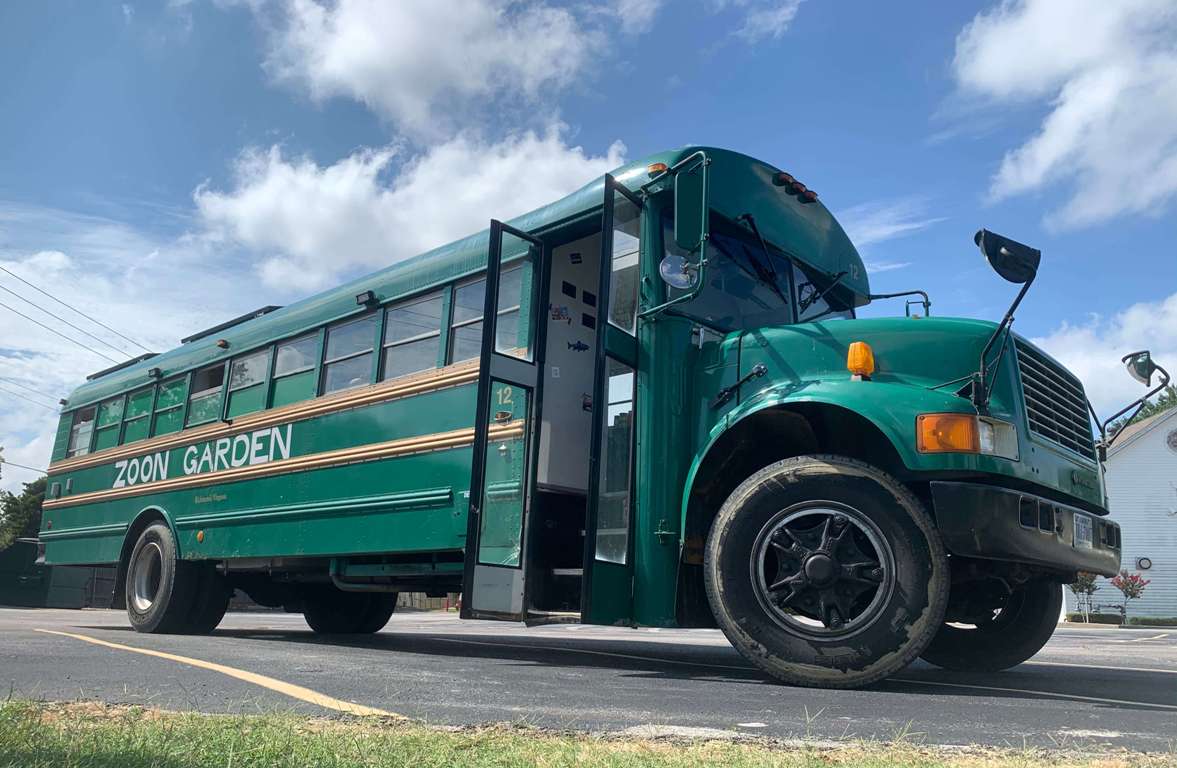
Author Jordan O’Donnell has taken skoolie living to a whole new level.
Sure, it’s not uncommon for writers to take to the road to promote their books. Think of book tours and you think of months’ long promotional jaunts, cross-country travel, book signings, and author meet-and-greets.
What you might not think of is doing your book tour while simultaneously living and working out of a converted school bus (aka “a skoolie”)…
With a team of 17 enthusiastic college interns, all of whom just met one another…
On a two-and-a-half month road trip across America…
During the summer of 2020—which, depending on your viewpoint, might either go down in history as “our summer of discontent” or “our summer of enlightenment.”
But then again, O’Donnell’s novel, Zoon Garden: The Decline of a Nation, is no ordinary book. And O’Donnell—a former FBI employee turned commentator on American culture and politics—is no ordinary first-time novelist.
So, it seems fitting he’s chosen a decidedly unconventional way to promote a decidedly unconventional book.
Skoolie Living Meets Book Promotional Tour

Jordan O’Donnell, author of Zoon Garden: The Decline of a Nation.
Why embark on a cross-country road trip in a skoolie with 17 college interns (each of whom is tasked with various marketing duties) to promote Zoon Garden?
That’s the first question I posed O’Donnell during our recent interview.
“Well, when you put it that way, it sounds pretty crazy,” admitted O’Donnell.
“I think the best way I would explain it is kind of like… why not? The book itself is about the state of America and what’s going on with the polarization and the division and all the controversy that’s going on in the country. I wanted to take the book straight to the American people. We felt the best way we could do that is to travel around the country and talk to different people and hear different people’s stories and tell them about the book.”
O’Donnell is quick to point out that although his promotional strategy might seem unorthodox, it has its roots in the American counterculture of the 1960s.
“Ken Kesey and the Merry Pranksters did a crazy school bus journey back in the 1960s, but theirs was a lot more drug influenced while ours is completely sober,” notes O’Donnell.
“In the modern day where everyone is trying to sell you something and there’s so much advertising, you have to really go above and beyond to stand out. That’s why we tried to go as untraditional as possible. We really needed to do something different than what everyone else was doing to really stand out.”
Getting the Skoolie Ready for Travel
O’Donnell first began thinking about doing a school bus conversion a few years back. He mentioned his ideas to his grandfather, who works in retirement as a bus driver for a handful of private schools in the Richmond, Virginia area. A few months later, his grandfather alerted him to a bus for sale. At $2,000 and with only 120,000 miles, it was a steal.
It took O’Donnell about a year to convert the bus, working part-time while writing his novel. He did the main build-out himself, relying on past carpentry experience. He called in a friend who was a mechanical engineer to help out with the electrical. A civil engineer friend helped out with the plumbing.
All told, he spent about $10,000 on the skoolie conversion, including the bus itself. Around $3,000 to $4,000 went toward the electrical system. He spent another $4,000 on materials, lumber, paint, fridge, furnishings, and plumbing.
“You can spend a lot less money if you’re willing to put in sweat equity,” he said. “We were on a pretty tight budget, so we just did all of it ourselves… If you have the knowledge and the ability and are willing to do the vast majority of the work yourself, I think you can keep your investment cheap.”
His goal was to have the skoolie sleep six or seven people comfortably. The skoolie doesn’t have a bathroom, so the team uses the bathrooms on the two travel trailers that accompany them on the trip.
O’Donnell said, “In the back we have a bunkroom that has four bunk beds. Then in the front we have two couches that double as beds. There’s a removable table that can be put in-between those two couches so you can sit eight people at the dining table. We have solar panels on top that feed into an electrical supply and that powers our fridge, our freezer, and our water pump.”
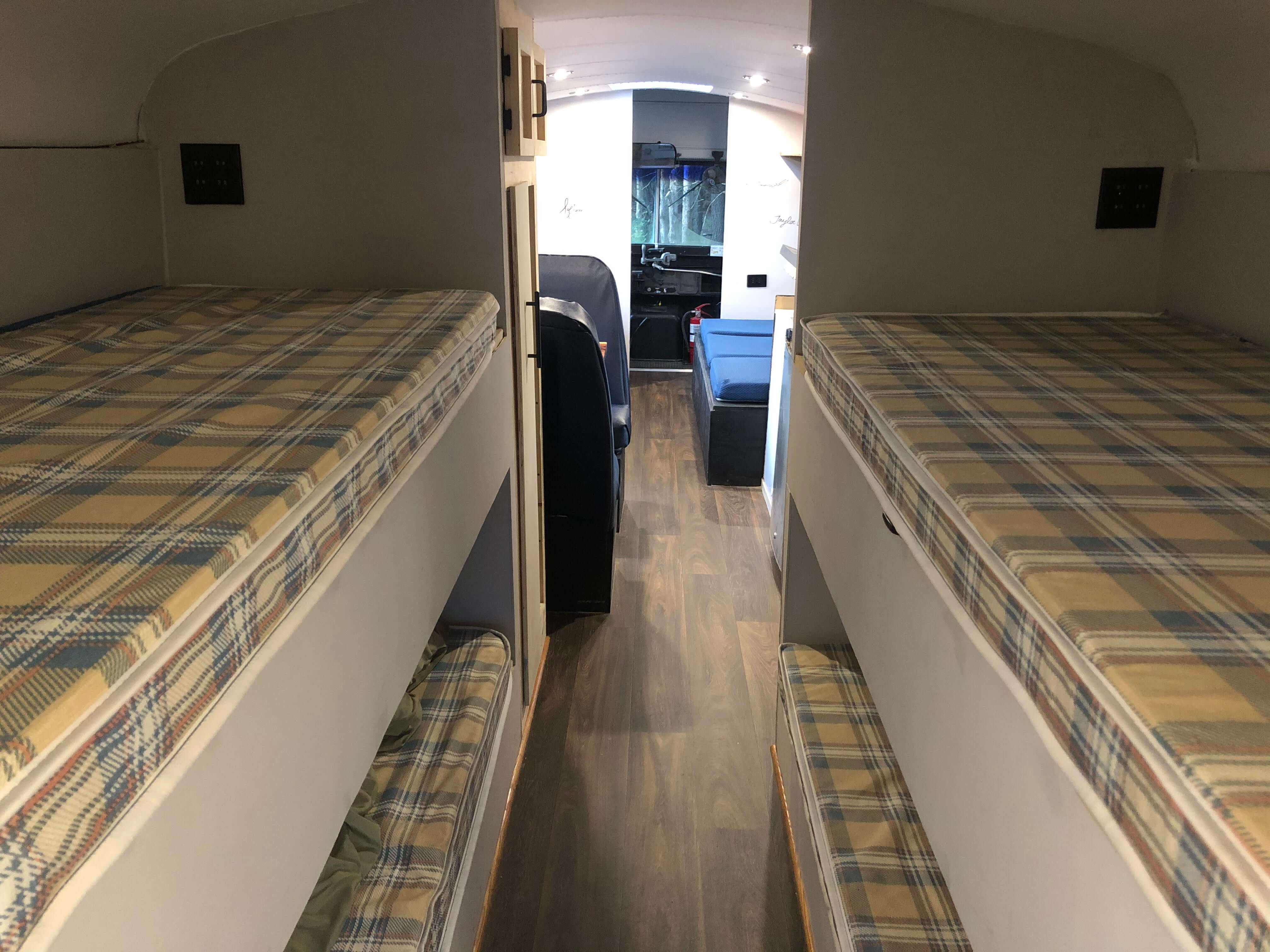
Skoolie bunkroom.
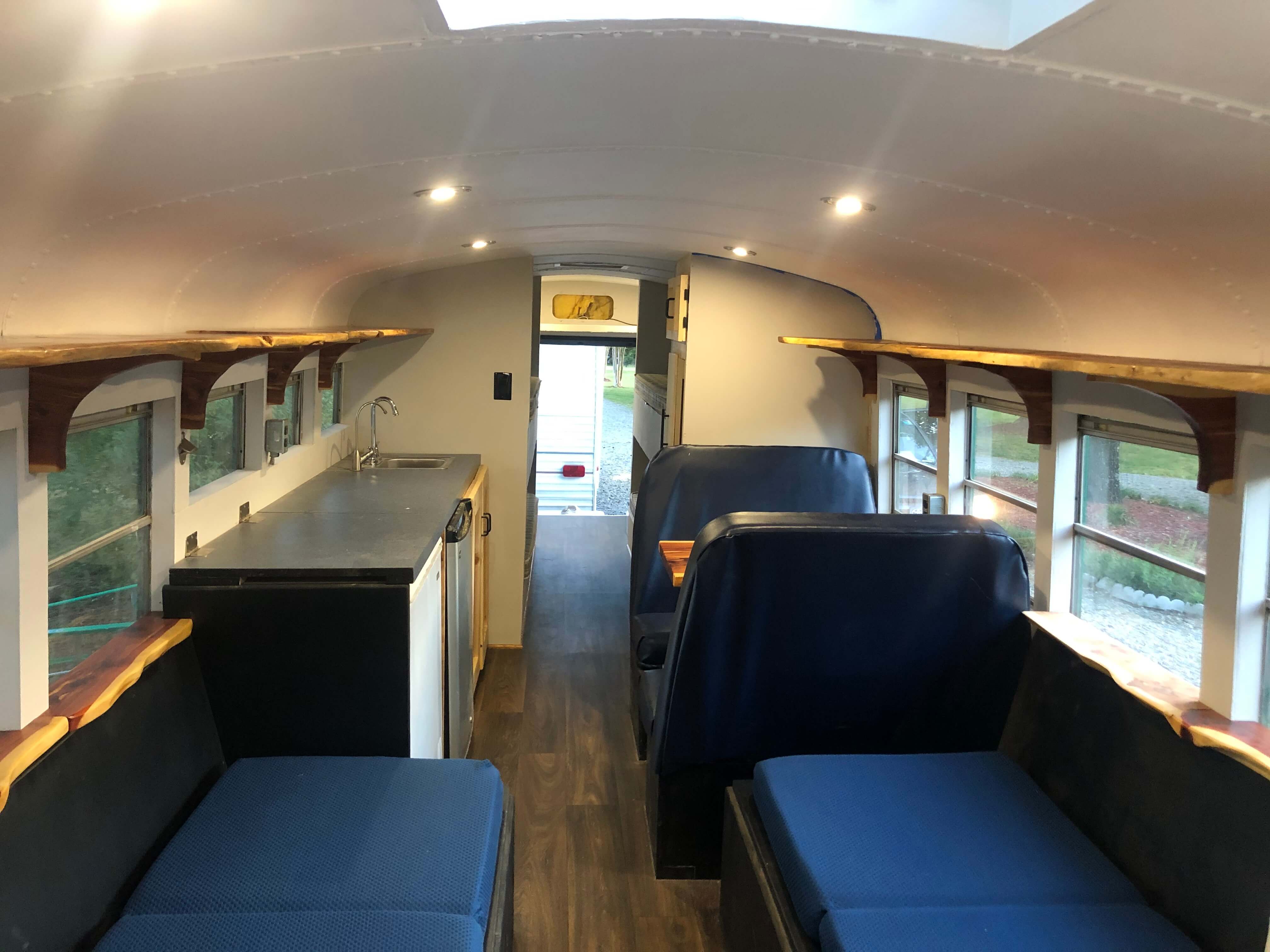
Skoolie kitchen, seating, and dining area.
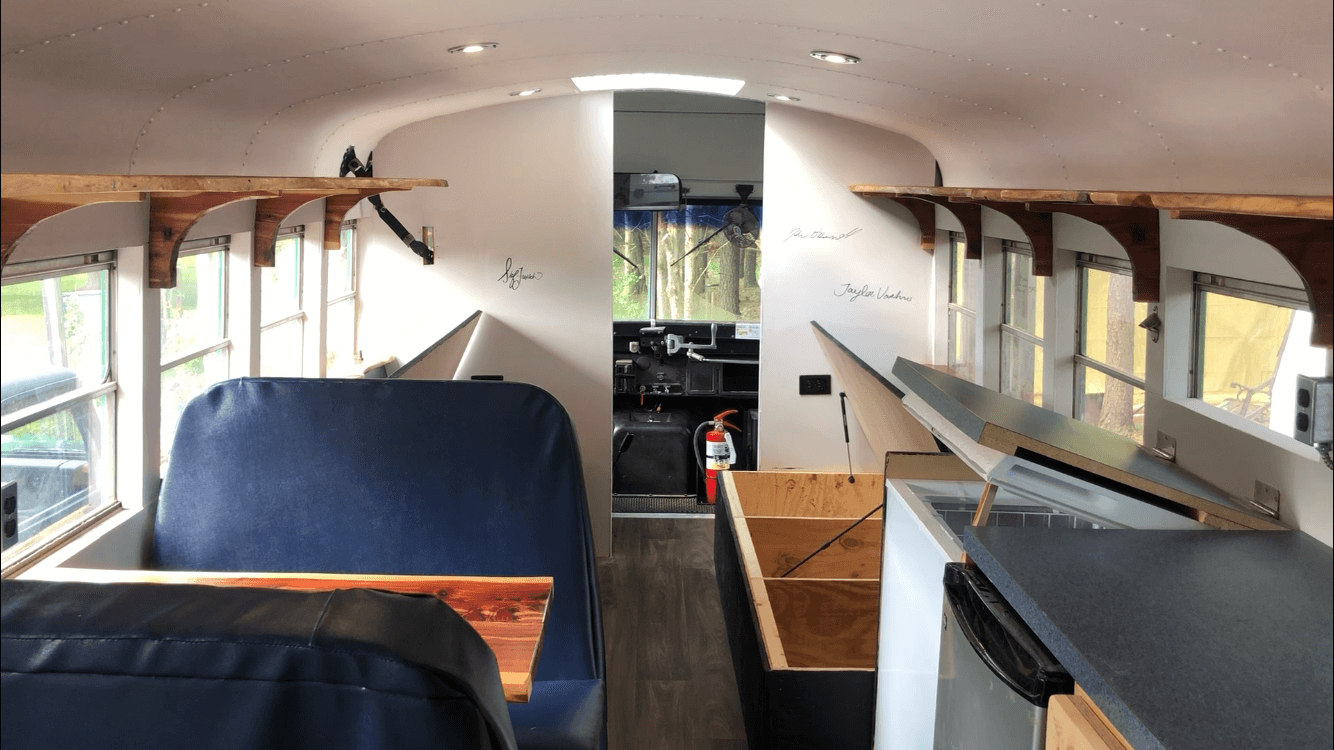
Skoolie interior looking toward front of bus.
“We wanted the electrical system to be totally self-sufficient,” says O’Donnell. “The idea was that we could pull into a campground and plug in just like a normal RV. But then we also have a reverse osmosis filtration system for the water. We can technically pull up to a creek and drink the water out of that. If we had to go to the middle of Alaska, we could be self-sufficient.”
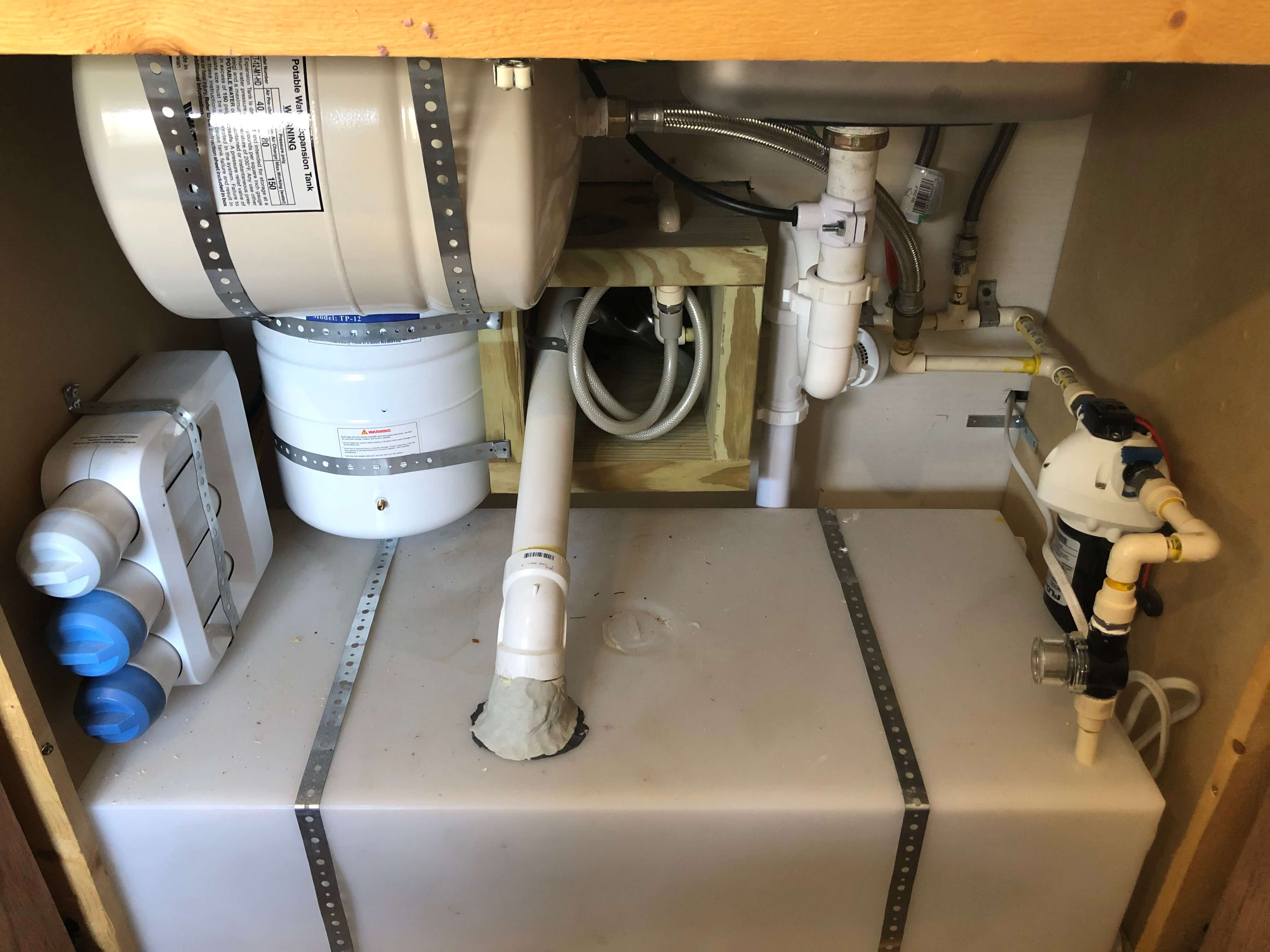
Skoolie water filtration system.
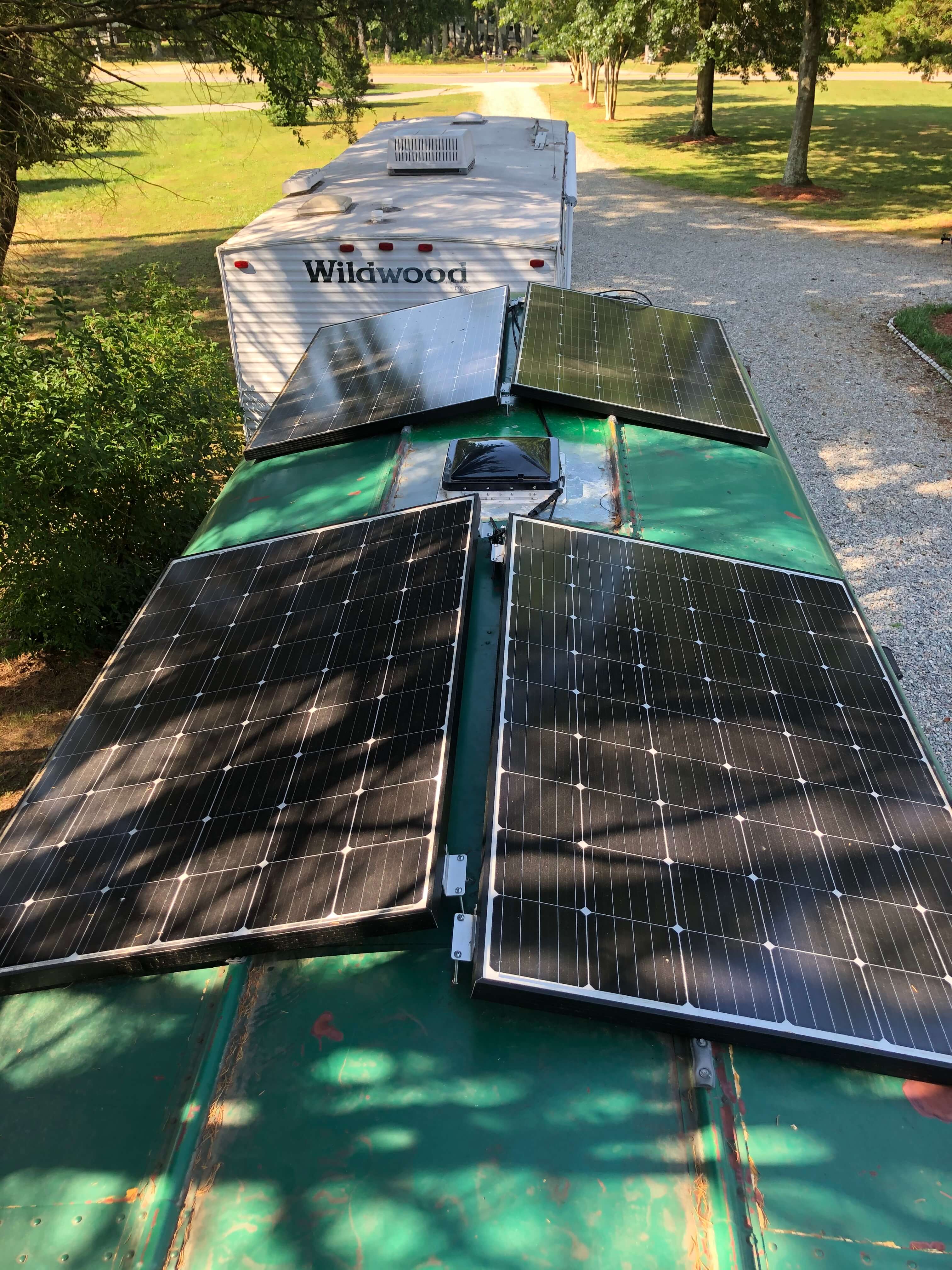
Solar panels on the roof.
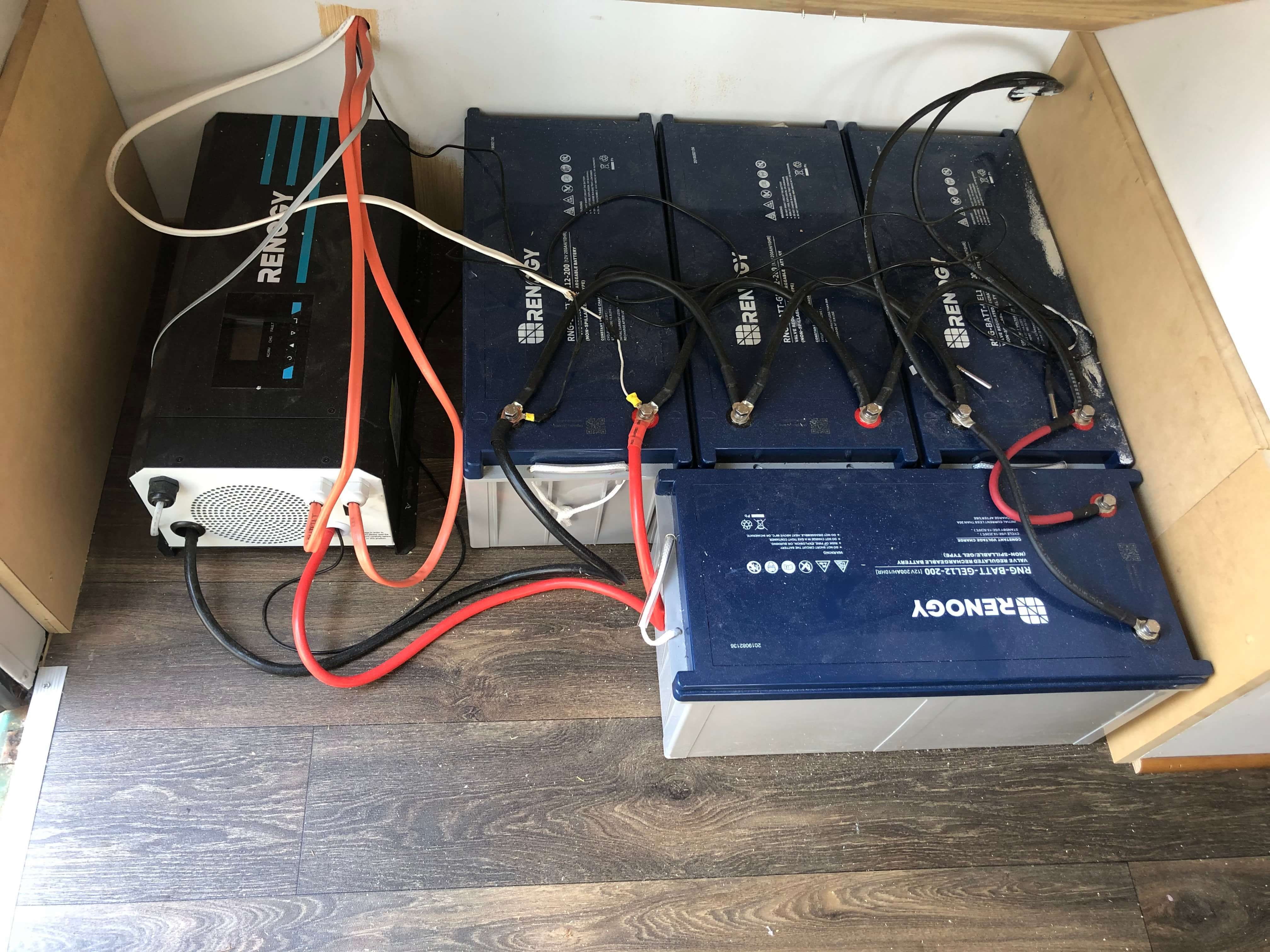
Battery bank and inverter charger.
The Challenges of Being a Digital Nomad
Being a digital nomad—someone who lives, travels, and works remotely on the road—poses its own set of unique issues. Add in a pandemic and you have a whole other level of concerns.
Here’s what O’Donnell has to say about the challenges they’ve faced on the road…
“I think foremost COVID is obviously the biggest challenge. We were debating even to start the trip up until the week we actually got everybody together. When we did get everybody together, it looked like everything was on the decline. And now everything is back up on the rise… So, that’s probably the top challenge. How do we keep everybody safe, how do we be smart, how do we stay within the CDC guidelines, and still be able to accomplish our mission?”
O’Donnell also admits it’s been a challenge having conversations with people and having some level of publicity when there’s hardly anybody out and businesses are closed. The team has had to be creative, being willing to adapt quickly to an ever-changing itinerary. They’ve relied on a mix of social media, podcast interviews, local newspaper interviews, broadcast media, and online virtual events to get the message out about the book.
One area that has been a decided positive on the trip has been their skoolie, which O’Donnell describes as “the stalwart of the trip.” While they’ve had mechanical problems with their two travel trailers—including a broken axle—the skoolie has remained a trouble-free workhorse. The only downside so far with the skoolie is having to slow down to 20 mph on mountain roads, a common complaint among skoolie owners.
Advice for Living and Working on the Road
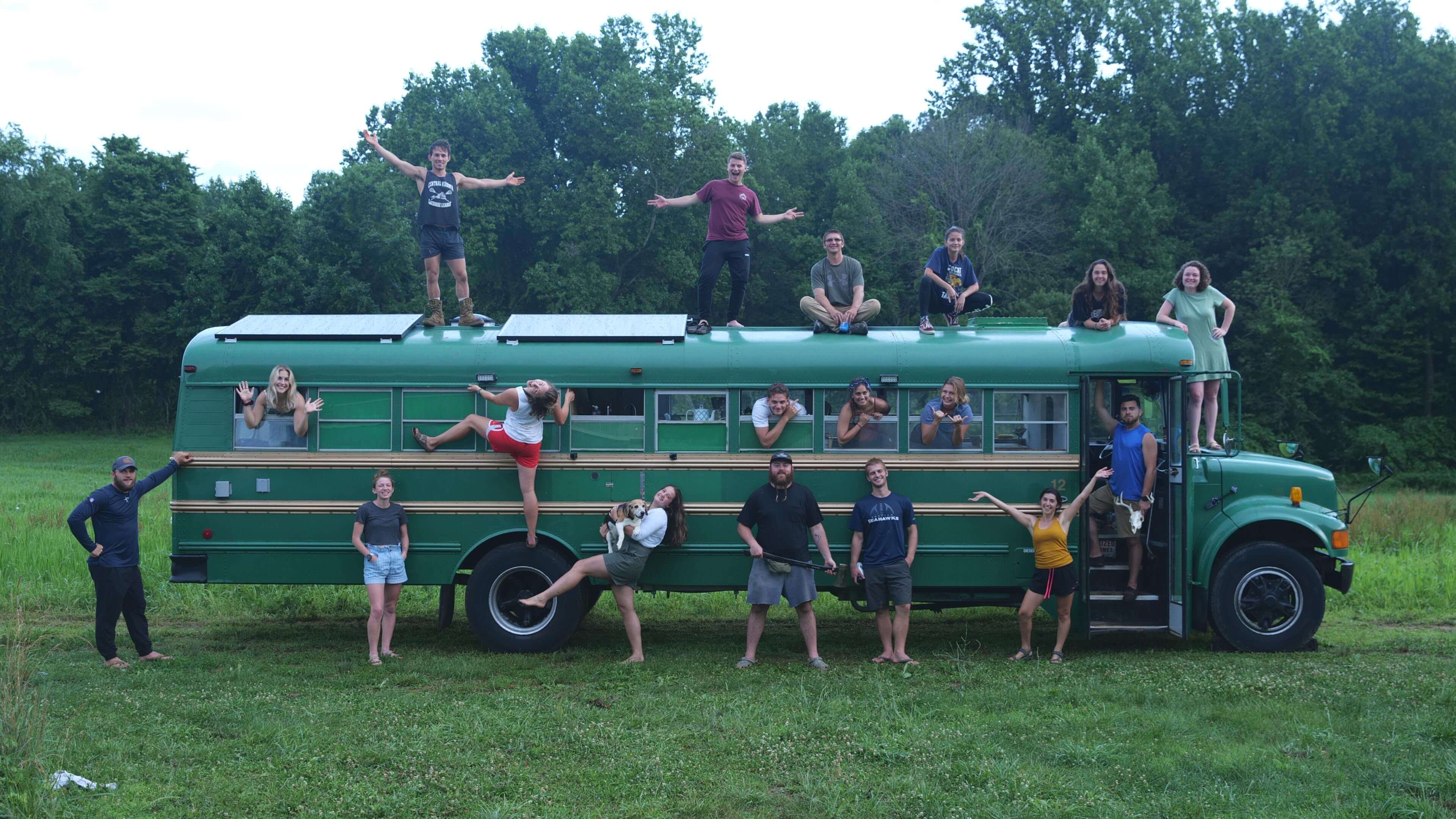
Author Jordan O’Donnell (top left) and his team of 17 interns pose with the Zoon Garden skoolie.
For anyone contemplating becoming a digital nomad, O’Donnell has three pieces of advice: Be frugal with your money, make sure you have a flexible work situation, and monitor your gigabyte consumption.
Says O’Donnell, “Figure out your wi-fi systems and get the best deal you can. For example, we bought two wi-fi hotspots early on and they both had 40 GB of high speed. Our 17 person team went through them in 3 days… If you truly want to be living the digital nomad lifestyle, you’re wi-fi connection is your lifeline to the world. You need to figure out your budget for the most reliable one and get a good grasp of how many gigabytes you’re going to be using every month.”
“Verizon has jetpacks which is a permanent hotspot. It’s basically a mobile router. When you’re on the road the jetpack acts more like a cellphone, so you have a gigabyte limit. That’s the downside of it. You have to keep tabs on how much you’re using… We haven’t struggled with a lack of connection. We’ve only struggled with running over our gigabyte limit.”
Also having a work situation that enables you flexibility is of paramount importance. “Most people are doing social media on the road or getting sponsorships,” he said. “If you do end up having a real job, having a company that is flexible is important because you’re going to run across a lack of connection or you’re going to run across other problems. You need a boss that’s pretty flexible.”
So, what’s the reaction to Zoon Garden been like?
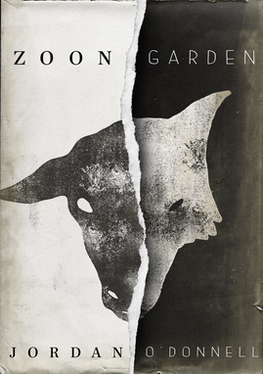
Zoon Garden book cover.
Despite the challenges they’ve encountered, O’Donnell says the reaction to his novel has been “awesome.” Some of that reaction might be because the message of the book resonates with what people are living through today.
“The book is a political allegory and a social critique of modern day America,” says O’Donnell. “It portrays America as a zoo and there are all these different tribes of animals that live within the zoo. They create a land based on life, liberty, and happiness. But they slowly realize they have different visions for how the zoo should be governed. The wolves and the sheep become the two main tribes. They slowly, accidentally destroy the zoo.”
O’Donnell’s motivation for writing Zoon Garden stems from the two years he worked for the FBI on Freedom of Information Act projects. Through this experience, he says he got a deeper understanding of the “polarization and corruption that is going on in Washington.”
He goes on to say: “I became very convinced that the potential for the country to head in a very bad direction was fully plausible, if not probable. I wanted to write something to help counteract that. Most of the books I’ve read about modern politics are very left wing or very right wing. They are just accusing one side or accusing the other. So, I wanted to take a big picture view and write a book that was just a social critique of everything that was going on. I critique the right, I critique the left, I critique social media, I critique mainstream media. I critique anything and everything.”
Many of the themes O’Donnell discusses in his book seem to be happening today. Quite a few of the book reviewers on Amazon have picked up on this, noting they feel like America has already descended into a version of Zoon Garden with the COVID-19 pandemic and the nationwide protests.
Despite writing the book as a warning, O’Donnell seems to feel there is some hope for the country, especially if we can strive for a middle ground instead of the polarizing bickering that has become prevalent in social and mainstream media.
Says O’Donnell: “You look back at the Civil Rights movement. The Dr. King ‘I Have a Dream’ speech is perfect. He didn’t try to come out and divide. He said I have a dream that one day little black boys and little black girls will play with little white boys and little white girls. That’s something unifying that 99% of Americans can get behind… I think the individual American needs to remove themselves from that daily news cycle and should think about the principles and ideals we should all strive for and how those principles and ideals fit and apply to every American regardless of gender, or race, or background. That’s a very macro idea, but I think it’s an idea that would really have some ripple effects across society.”
For more information on Zoon Garden: The Decline of a Nation, go to Jordan O’Donnell’s website or check out Amazon to purchase the book.
Yearning to hit the road in a skoolie yourself? Be sure to check out our Guide to Living in a Converted School Bus. It’s packed with information you need to know!
More Tips
 When You Should (and Shouldn’t) Pay Rent With a Credit Card
When You Should (and Shouldn’t) Pay Rent With a Credit Card
It’s tempting, but should you really? Beware of fees, interest charges, and credit score dangers. Read More
 7 Tips for Saving Money on Homeowners Insurance
7 Tips for Saving Money on Homeowners Insurance
Smart tips to protect your home with affordable homeowners insurance. Save money and still get the coverage you need. Read More
 7 Free Ways to Help You Save Money on Your Electric Bill
7 Free Ways to Help You Save Money on Your Electric Bill
No reason to be “shocked” by your electric bill! These 7 tips will help you save money month after month. Read More
 Landlords and Tenants: Trading Places
Landlords and Tenants: Trading Places
A new program hopes to improve student / landlord relations by helping them understand each other’s position. Read More
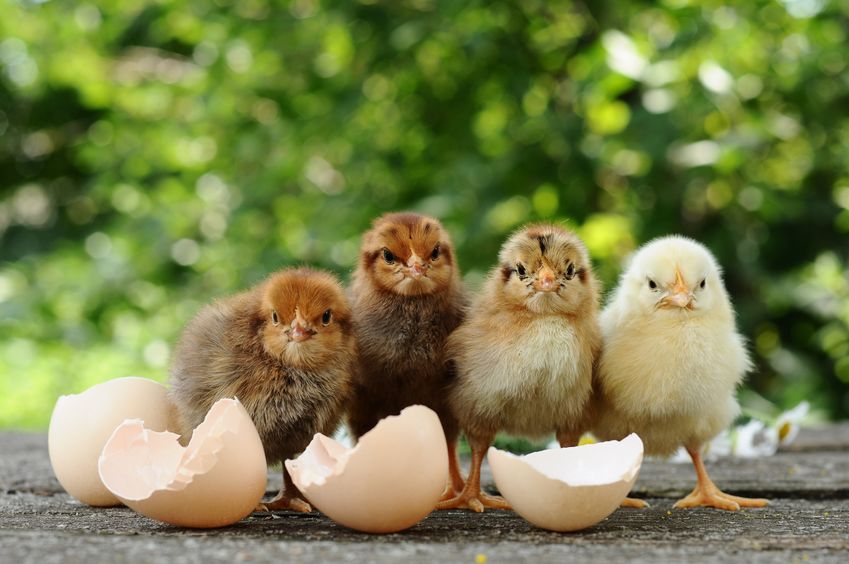 Don’t Let This Medicare Myth Wipe Out Your Retirement Nest Egg
Don’t Let This Medicare Myth Wipe Out Your Retirement Nest Egg
What you don’t know about Medicare could cost you a small fortune. Learn how to protect your retirement dreams. Read More
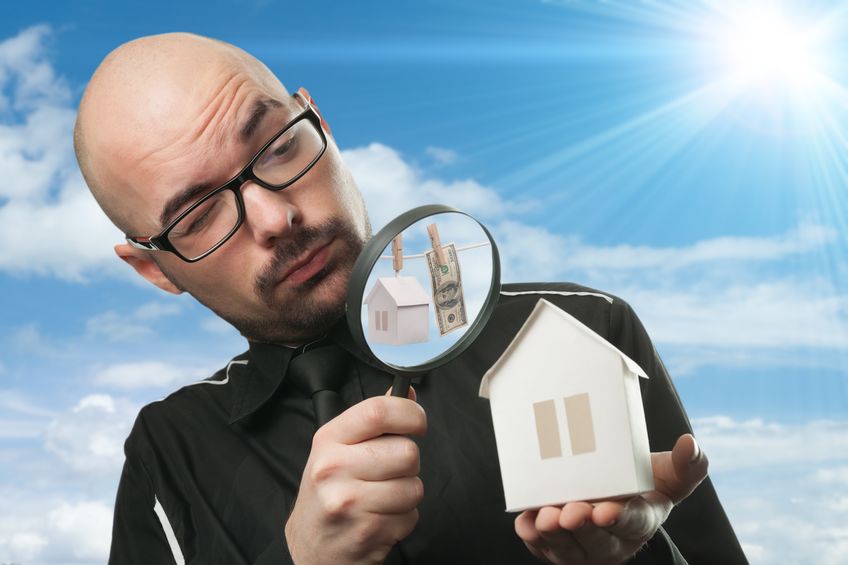 7 Surprising Facts Anyone Entering a Housing Lottery Should Know
7 Surprising Facts Anyone Entering a Housing Lottery Should Know
These housing lottery facts spotlight little-known secrets about this growing trend in housing. Millions have affordable new homes. Will you be next? Read More
 Would You Live in a “Zombie Property?” These Might Tempt You…
Would You Live in a “Zombie Property?” These Might Tempt You…
With low prices and modern amenities, renovated “zombies” are becoming a favorite among bargain house hunters. Read More
 Affordable Housing Lottery: 7 Tips for Winning Your New Home
Affordable Housing Lottery: 7 Tips for Winning Your New Home
Winning an affordable housing lottery is a daunting task. But these tips give you a leg up over the competition. Read More
 Mansions Now Among the Best Cheap Homes for Rent in Vancouver
Mansions Now Among the Best Cheap Homes for Rent in Vancouver
Beer budget but champagne tastes? Not to worry — new tax laws mean some lucky folks can now afford to rent luxury homes! Read More
 Attention Students: 7 Ways a Senior Home Share Saves You Money
Attention Students: 7 Ways a Senior Home Share Saves You Money
Are you a student? Do you have friends or family members who are students? A great way for students to save money on housing is … Read More
 7 Hidden Costs of Building a Shipping Container Home
7 Hidden Costs of Building a Shipping Container Home
Don’t get caught off-guard by the cost of building your dream shipping container home. Check out these 7 hidden costs and prepare your budget in … Read More



